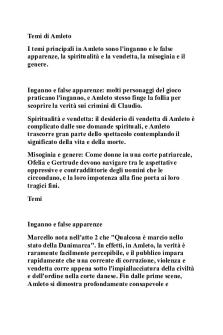Madness in Hamlet PDF

| Title | Madness in Hamlet |
|---|---|
| Course | Shakespeare |
| Institution | Queen Mary University of London |
| Pages | 1 |
| File Size | 40.8 KB |
| File Type | |
| Total Downloads | 32 |
| Total Views | 432 |
Summary
Madness in Hamlet, key quotes/critics...
Description
Madness
A01:
A05:
Hamlet’s madness is real and Ophelia’s madness is real Hamlet’s madness is feigned vs Ophelia’s real madness
Anna K. Bardo- psychological criticism in which Nardo uses the double bind theory to explain Hamlet + Ophelia’s madness, the theory contends that a person who is receiving two different mutually exclusive demands from a family member e.g. Hamlet’s mother ( marrying uncle, acts as a detachment but then asks for Hamlet’s love)+ deceased father (asking him to avenge his death but do nothing to his mother) place double bind situation + Nardo argues that Hamlet’s feigned madness is how he escapes true madness + Ophelia's also caught in double bind situation (Polonius tells her to be both chaste + to wind Hamlet over with her body) T.S Eliot- ‘For Shakespeare, it is less than madness and more than feigned. Levity of Hamlet, his repetition of phrase, his puns, are not part of a deliberate plan of dissimulation, but a form of emotional relief.’ Alexander W. Crawford- ‘Hamlet deliberately feigned fits of madness(to)...disconcert the King.’ Elaine showalter in Representing Ophelia notes that ‘the mad Ophelia’s bawdy songs and verbal licence ...seem to be her one sanctioned form of self assertion as a woman.’
Key Quotations: “As I perchance hereafter shall think meet…to put an antic disposition on.” (Act 1, Scene 5 Hamlet) “Mad for thy love? My lord I do not know/ But truly I do fear it.” (Act 2, Scene 1 Polonius and Ophelia) “Something have you heard/of Hamlet’s transformation; so call it” (Act 2, Scene 2 Claudius to R + G) “Your noble son is mad/ Mad I call it, for to define true madness, what is ‘t but to be nothing else but mad?” (Act 2, Scene 2 Polonius) “I am but mad north-north west; when the wind is southerly I know a hawk from a handsaw.” (Act 2, Scene 2 Hamlet to R + G) “I essentially am not in madness/but mad in craft.” (Act 3, Scene 4 Hamlet to Gertrude) “One incapable of her own distress.” (Act 4, Scene 7 Gertrude on Ophelia) “Poor Ophelia/ Divided from herself and her fair judgement.” (Act 4, Scene 5 Claudius)...
Similar Free PDFs

Madness in Hamlet
- 1 Pages

Hamlet
- 12 Pages

Hamlet
- 15 Pages

Back from Madness
- 2 Pages

Hamlet ICE
- 2 Pages

ReseÑa Hamlet
- 2 Pages

The theme of betrayal in Hamlet
- 1 Pages

Hamlet notes
- 18 Pages

Hamlet resumen
- 3 Pages

Riassunto Hamlet
- 2 Pages

Scene Summary Hamlet
- 20 Pages
Popular Institutions
- Tinajero National High School - Annex
- Politeknik Caltex Riau
- Yokohama City University
- SGT University
- University of Al-Qadisiyah
- Divine Word College of Vigan
- Techniek College Rotterdam
- Universidade de Santiago
- Universiti Teknologi MARA Cawangan Johor Kampus Pasir Gudang
- Poltekkes Kemenkes Yogyakarta
- Baguio City National High School
- Colegio san marcos
- preparatoria uno
- Centro de Bachillerato Tecnológico Industrial y de Servicios No. 107
- Dalian Maritime University
- Quang Trung Secondary School
- Colegio Tecnológico en Informática
- Corporación Regional de Educación Superior
- Grupo CEDVA
- Dar Al Uloom University
- Centro de Estudios Preuniversitarios de la Universidad Nacional de Ingeniería
- 上智大学
- Aakash International School, Nuna Majara
- San Felipe Neri Catholic School
- Kang Chiao International School - New Taipei City
- Misamis Occidental National High School
- Institución Educativa Escuela Normal Juan Ladrilleros
- Kolehiyo ng Pantukan
- Batanes State College
- Instituto Continental
- Sekolah Menengah Kejuruan Kesehatan Kaltara (Tarakan)
- Colegio de La Inmaculada Concepcion - Cebu




